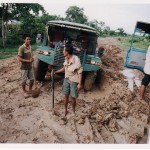Theme: Health and Development in Post-Conflict Societies
Case Study Country: Cambodia
Readings:
1) Verhoeve:
A straight forward reading on education in Cambodia. Think about the importance of education and the implications of a (mis)representation of history, gender and culture.
2) Hughes and Pupavac:
A big picture view on the pathologisation of post-conflict states. This is a very thought-provoking article that questions the way we perceive post-conflict societies in the first place. Reflect on instances where you have encountered the pathologisation of conflict or post-conflict states.
3) Zimmer et al.
An investigation into a demographic of society not usually addressed apart from other high-risk groups: the elderly. This another example of quantitative analysis for a social science phenomenon, so don’t stress yourself out trying to understand the methodologies in details. Look for the big picture; the implications, themes, and research findings.
Discussion Questions:
1. How has the pathologisation of post-conflict societies affected the decisions of policy makers and leaders on all levels (local, national, international)? Do you subscribe to their argument?
2. What are some possible solutions to the plight of the elderly in post-conflict Cambodia?
3. What are some contradictions found in the Cambodian education system? How can these be addressed?
Announcements:
- Alex Budden has asked for some feedback regarding his talk. Please think about aspects you enjoyed and/or aspects or topics you would have preferred to discuss/not discuss.
- Please remember NOT to write your name down on the 2 hard copies of the news article report and the 2 hard copies of the news article itself.
Cheers,
– Amber and Julia








